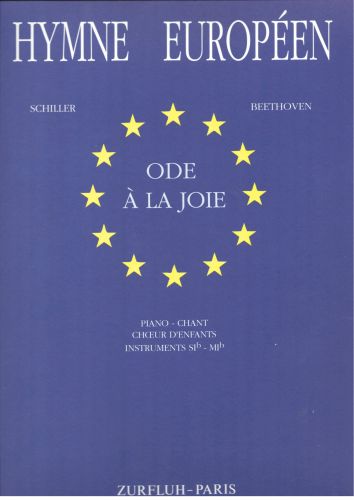
It is not only because I don’t like Beethoven that I detest the European “national” hymn, the Ode à la joie, a work that has been based on his ninth symphony.
The fact that it has been adapted by the nazi adept Herbert von Karajan makes this melody indigestible to serve as a song for all Europeans.
With good reason Esteban Buch concludes his analysis on Europe and its hymn in Le Monde, 3/ 4 May 2009 with the observation that
un hymne n’est jamais que ce que les gens en font. En tout cas de cause, du moment qu’il s’agit d’un symbole politique, c’est aussi une question politique.
Thus, what to do if we would make the political decision that this Ode à la joie is not the appropriate melody to express the sentiments of all people from Europe for their intriguing part of the world? I would not recommend trying to find one other melody. What we really share in Europe are countless wars, and since some decades the trial and error to live in peace and prosperity together, while respecting the enormous differences we have. Why not take those differences as the starting-point for the melodic expression for the hesitating feeling that in Europe something can be constructed that would make our common and individual life better? There is nothing wrong with the recognition that there exist in Europe not (yet) a common deeply felled positive experience that can be covered by one melody and certainly not by a common text for such a song.
Let us use the fascinating reality of Europe that we are too diverse even to imagine that our sentiments can be covered by one common “national” anthem. The attractive side of Europe is that it is extremely pluriform. This is a value that should be cherished. This pluriformity is the opposite of the drive of some European bureaucrats that we should share also a common “national” anthem, an idea that landed even in the meanwhile rejected Constitution. However, we should have the opposite of one European “national” anthem. Therefore I have a proposal.
Every year we commission twenty seven composers and poets from all member states of the European Union to create a song or a ballad that is in one way or another related to Europe. A variant on this proposal could be that every composer makes three, four or five notes and send them to a composer from one of the other countries who uses those notes as a source of inspiration for creating, together with a poet, a song that has been influenced by the fact that there is something that calls itself Europe. The condition should be that the melody is not too complicated; it should be possible for many people to sing it. The texts however are in the many languages that exist. In Spain we can imagine that on the same melody three poets make texts: one in Castellan, one in Catalan and one in Basque.
This means that we have at the end of every year even more than twenty seven songs that are linked to Europe, probably on most unexpected ways. We continue to do this every year, and distribute those songs widely. For instance, the network Europa Cantat has contact with hundreds of choirs in Europe and thousands of singers. It is not excluded that many of them like to sing those songs, but also pop bands may feel inspired by those (copyright free) works. Radio and television may broadcast them, and it will be published and distributed widely in Europe. The nice aspect of this proposal that it is the opposite of the Eurosongfestival which presents melodies and texts on the lowest common denominator!
Indeed, let’s give each other as European citizens a present for now and for the future: a huge stock of interesting, inspiring, and maybe funny or sad songs. And then, let’s wait and see what happens. Let diversity flourish!